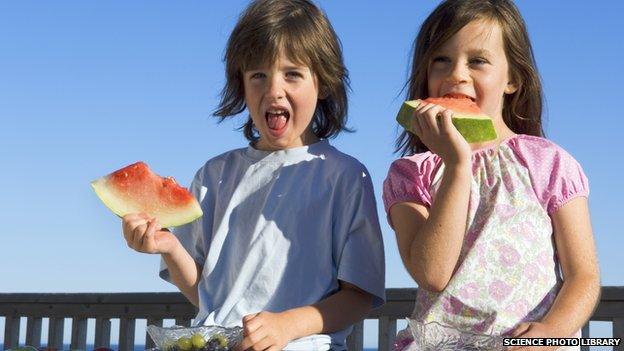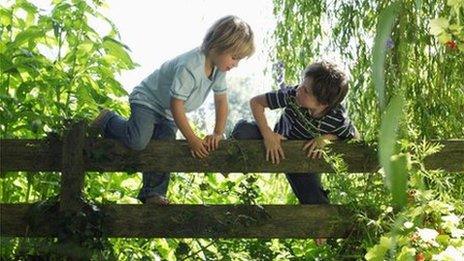Secret to happy kids - a bit of TV and the odd takeaway
- Published

Does healthy eating make children happy?
Seven-year-olds are happier when they are allowed some sweets, snacks and television time, rather than none at all, suggests a study of children's well-being.
Children who enjoyed school PE "a lot" were more likely to feel positive than those who didn't like it.
Nearly 13,000 children were surveyed as part of a study by NatCen Social Research, external.
Researchers said a healthy lifestyle had a longer-term effect on well-being.
The study, funded by the Department of Health, looked at many different factors which have an impact on children's happiness or how much they worry.
It found that seven-year-old children were happiest when they got on well with siblings, had fun with family members at weekends and had parents who did not shout or smack them.
Children were more likely to feel unhappy and worried if they lived in a deprived area. There was no difference in how worried or happy they felt whether they had one parent or two.
Never say never
However, when researchers looked at how healthy eating and healthy behaviour affected happiness in children, they found an inconsistent picture.
On the one hand, enjoyment of PE lessons was positively associated with child well-being, but a healthy diet was not.
For example, children who regularly ate snacks such as biscuits and cakes were just as likely to report being happy as children who did not report eating such snacks.
Well-being was lower among children who never watched television and among those who watched it the most, while well-being was higher among those who watched television, but for less than an hour a day.
The study said: "Being happier and lacking worry does not mean never having sweets, snacks and television. In fact, there was some indication in the results that higher well-being was more likely when these were enjoyed in moderation."
The influence of a healthy diet and plenty of exercise on well-being was "likely to be more complex and longer term", it added.

Seven-year-olds who were allowed snacks in moderation were 'happier'
It said establishing positive health behaviours at an early age could lead to healthier outcomes in later life, such as a normal BMI - body mass index - and fewer chronic health conditions, which could contribute to higher well-being at that stage of life.
Teenagers and takeaways
The data for the study was gathered from the Millennium Cohort Study of 12,877 children, and their parents, born in 2000 and surveyed in 2008.
In a separate survey of 11- to 15-year-olds' well-being, which forms party of the same study, researchers found a similar relationship between some aspects of healthy eating and happiness.
Young people who reported eating fast food or takeaways at least once a week reported feeling happier on average, compared with those who ate fast food only occasionally or never.
But it is possible that eating this type of food as a family or social activity can have a positive impact on children and young people's well-being.
Jenny Chanfreau, senior researcher at NatCen Social Research, said there were still many strong arguments for promoting healthy behaviour among children.
"Not least that behaviours learnt early in life may continue into adulthood and, unlike among children, adults who eat more fruit and vegetables do have higher levels of well-being."
The study's finding that children who said that they liked PE "a lot" had much higher odds of happiness than children who said that they like it "a little" or "not at all" could be important for primary schools, it said.
"Making PE lessons playful and fun is both good for child well-being and may contribute to establishing positive health behaviours for later in life," the study said.
- Published25 October 2013

- Published3 June 2013
